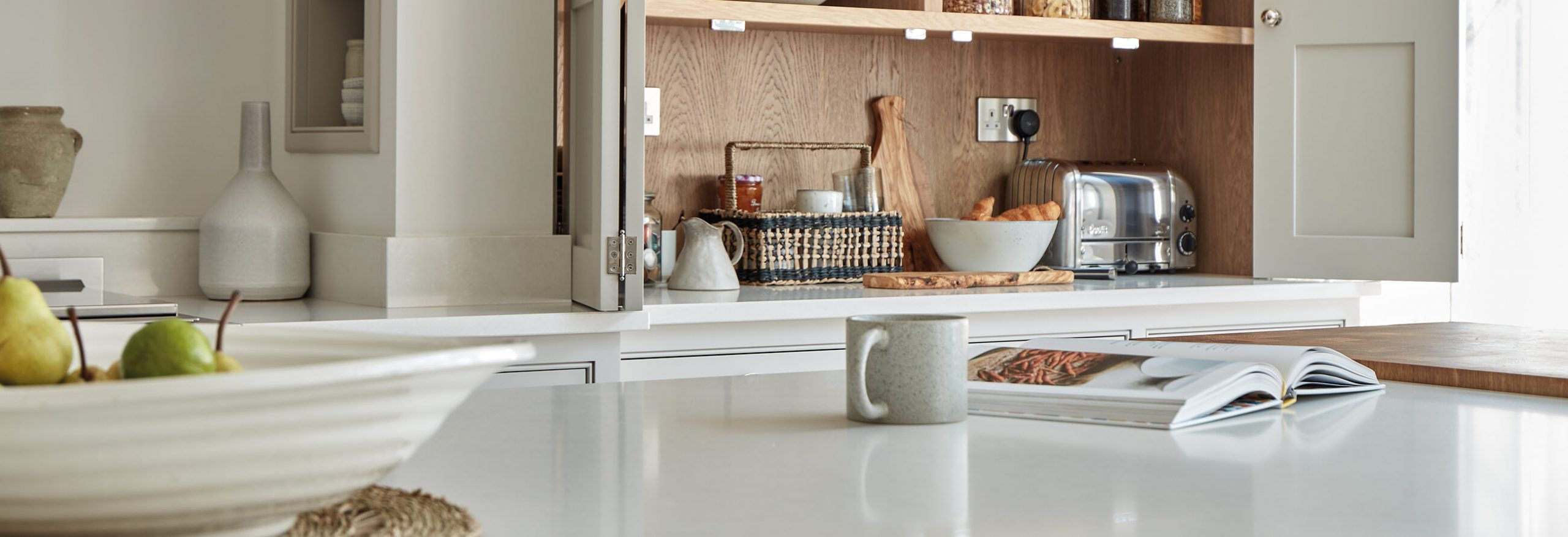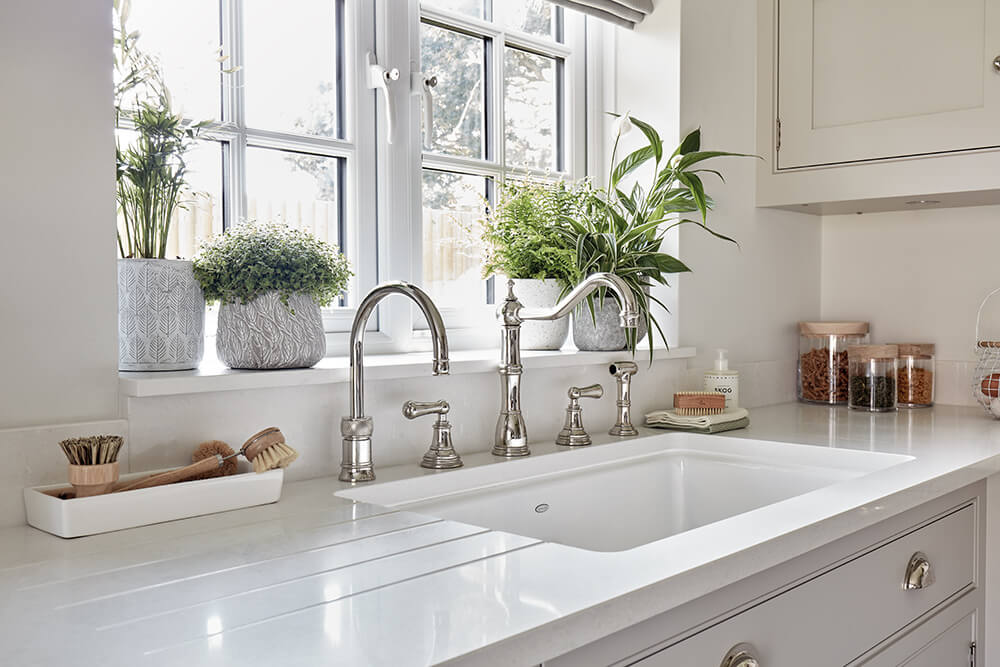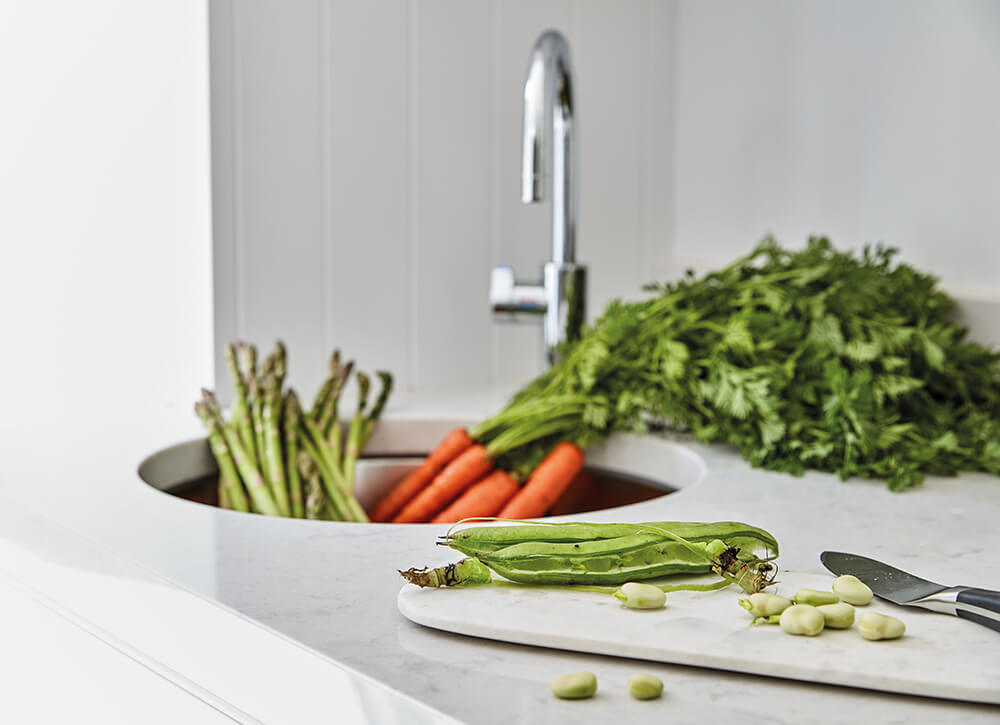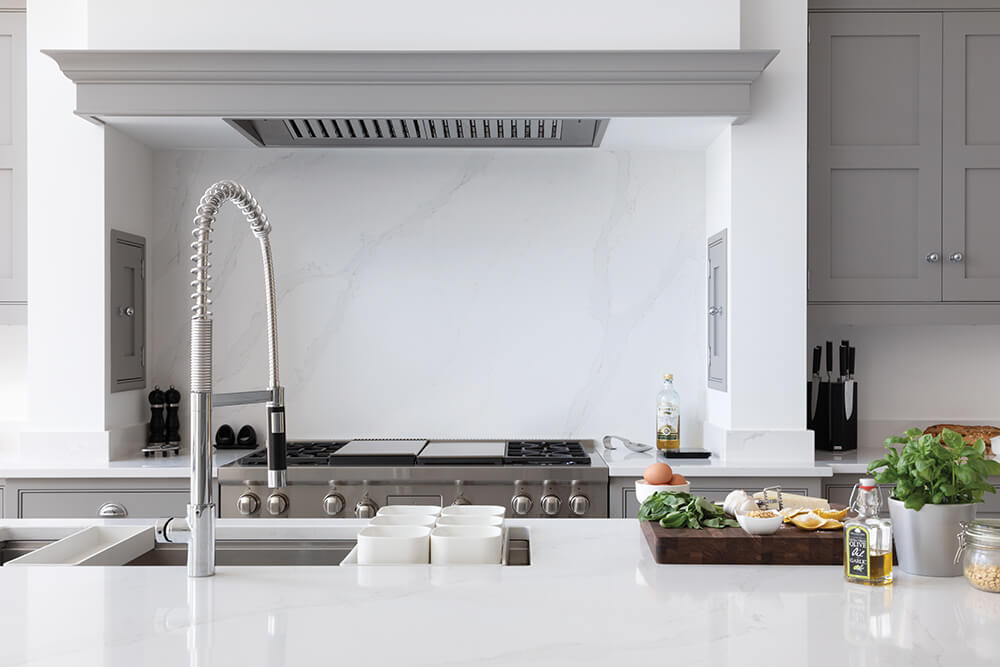

The kitchen is at the heart of many homes, a place where meals are lovingly prepared and enjoyed by friends, where families gather, and where we nurture our bodies and souls. In our seasonal self-care guide below, explore the benefits of seasonal ingredients, the power of a well-organised kitchen, and the satisfaction that comes with mindful cooking.

Why it matters: Connecting with the outdoors through your kitchen boosts your mood and keeps you in tune with the changing seasons, influencing your daily habits and meal choices. Besides optimising your garden views, natural light can transform your kitchen into a bright, inviting space that fosters wellbeing.
How to do it: Arrange your kitchen and living areas to maximise garden views, removing any tall items that block the sightline from your kitchen island, dining table, or window sills. If large windows or bifold doors aren’t an option, why not bring the outdoors in with potted plants or seasonal floral arrangements. To enhance natural light further, consider changing your window dressings to something sheer or opting for a light and airy colour palette. Features like quartz countertops that reflect light and glazed cabinetry can also help maintain a fresh, spacious feel.
Why it matters: No matter what size your kitchen is, it’s understandable that it can be challenging to keep it well-functioning, calm and clutter-free. Clever kitchen organisation minimises stress and can improve cooking efficiency by making tools and ingredients easily accessible.
How to do it: A regular seasonal reassessment and fairly ruthless clear out is essential in the kitchen. To make it easier:
Why it matters: Ingredients are often fresher, more flavourful, and nutrient-rich, especially during the harvest months. They can help you stay in tune with the changing seasons and contribute to a more varied and balanced diet.
How to do it: Visit local farmers’ markets or check store labels to find out what’s in season when you’re shopping. Incorporate these ingredients into your meals to make the most of their peak flavour and nutritional benefits. For example, you can choose squash and apples in the autumn and berries and leafy greens in summer.
Why it matters: Meal planning and preparation can reduce daily stress, save time, and ensure that healthy options are available throughout the day, no matter how busy you are.
How to do it: Dedicate a portion of your week to planning meals, with Sunday being an ideal time to kick off a fresh start. Begin by drafting a shopping list that aligns with your meal plans, and prepare ingredients. Whenever possible, cook and freeze meals to ensure you have nutritious, ready-to-eat options available. Organise your ingredients and meals in the fridge and freezer for efficient storage using clear, stackable containers. Label each container with the contents and date to streamline access and maintain organisation. This approach not only saves time but also reduces food waste, helping you keep your kitchen tidy and your meal prep hassle-free.

Why it matters: Mindful cooking can help you unwind after a hectic day. This approach not only helps you to slow down but also improves your cooking experience, boosting your satisfaction with every dish you make.
How to do it: Immerse yourself in meal preparation by paying attention to the rhythmic actions of chopping, stirring, and simmering. This attention can soothe your mind, offering a necessary break from everyday stress. Dedicate time to the process and refrain from multitasking to truly connect with cooking.

Why it matters: Comfort foods, known for their warmth and satisfaction, are ideal for autumn and winter. By using wholesome, seasonal ingredients, these dishes provide both psychological comfort and valuable nutritional benefits.
How to do it: Adapt traditional comfort food recipes to include whole grains, lean proteins, and vegetables. For example, lighten classic dishes by substituting cream with Greek yoghurt or using cauliflower mash instead of potatoes. Experiment with spices and herbs to balance flavours and add depth. By being mindful of these adjustments, you can enjoy comforting meals that nourish both the body and soul.

Why it matters: Embracing seasonal cooking traditions can deepen your connection to the time of year. This approach brings variety to your table and celebrates the unique flavours each season offers.
How to do it: Explore seasonal recipes and techniques that celebrate the time of year. In autumn, delight in baking pumpkin spice loaves or savoury squash soups. As summer rolls around, enjoy the freshness of vibrant salads brimming with juicy tomatoes and crisp cucumbers. You can also get creative with festive Halloween, Bonfire Night, or Christmas dishes.
By implementing these ideas, you can turn your kitchen into a space that supports your seasonal self-care and overall wellbeing. Adjust your practices as the seasons change to keep your cooking routine both efficient and enjoyable.